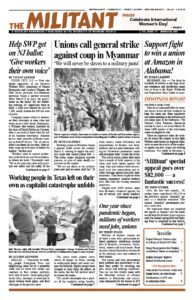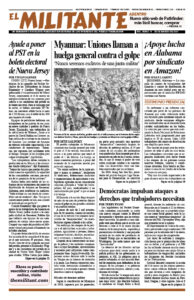SYDNEY — Australian Prime Minister Scott Morrison is refusing to retreat from confrontations with the Chinese government over trade, investment and Beijing’s influence in Australia.
The Australian rulers are caught between their major trading partner, China, and their main military ally, Washington. The U.S. rulers are determined to maintain their dominance over trade and investment in the region and restrict Beijing’s economic and military influence. None of these competitors care about the consequences of their disputes for the working class, who they all seek to exploit and oppress.
Last November the Chinese Embassy in Canberra released a dossier of 14 “complaints” against the Australian government. “If you make China the enemy, China will be the enemy,” it threatened. To back that up, Beijing imposed tariffs and bans on a number of Australian exports.
The Chinese government accuses Canberra of blocking Chinese corporations from efforts to take over Australian companies, organizing police raids on Chinese living in Australia and imposing visa restrictions on Chinese journalists and academics.
“The foreign policies of the Australian government defend the interests of the country’s bosses, who are imposing worsening conditions on Australian workers,” Linda Harris, Communist League candidate for the Canterbury-Bankstown Council in Sydney, told the Militant.
“The working class needs its own foreign policy, starting from solidarity with fellow working people — from those fighting military rule in Myanmar to working people and youth in Hong Kong facing assaults by Beijing,” she added.
With a small domestic market, the bulk of Australian mining and farm production is exported. In recent decades the country’s billionaire families have profited handsomely from booming exports of mostly raw materials to the expanding Chinese economy. Over decades the development of capitalist production in China has led to the huge growth of the working class there.
Rulers face rising competition
Since the second imperialist world war the Australian rulers have depended on a close alliance with Washington, the world’s dominant imperialist power, to defend their interests. Canberra has stepped up cooperation with the U.S. rulers in response to the rise of Beijing as a regional power.
Successive Australian governments have expanded Canberra’s armed forces and linked them more closely with the U.S. military. Following Washington’s lead, Canberra has also deepened its military ties with the Japanese and Indian governments as counterweights to Beijing’s increasing clout.
The Australian navy joins military exercises led by the U.S. Navy in the South China Sea. Shipping lanes there carry more than half of Australian exports — to Japan and South Korea as well as China. The Chinese rulers claim most of the South China Sea and have constructed artificial islands there, including military bases.
The rift between Canberra and Beijing deepened last April when the Australian government called for an international inquiry into the Wuhan, China, origins of the COVID-19 pandemic. With imperial arrogance, Prime Minister Morrison said the inquiry should wield the powers of “weapons inspectors.”
Beijing complains Canberra is interfering with the Chinese government’s oppressive treatment of the Uighur nationality in Xinjiang as well as its policies in Hong Kong and its relations with Taiwan. It accuses the Australian federal government of laws “aimed to torpedo” the Australian state of Victoria’s participation in Beijing’s Belt and Road program, designed to facilitate exports by Chinese companies.
Beijing has retaliated with tariffs that block 20 billion Australian dollars’ worth of exports to China ($15.5 billion). Barley, beef, wine, lobsters, wheat, timber and coal have been hit with taxes or bans. Beijing suspended coal imports worth over AU$14 billion in November.
But the two biggest exports by Australian mining and energy firms to China, iron ore and natural gas, have continued unrestricted.
Canberra has long had duties on some Chinese exports.
China-based corporations and banks in the South Pacific are now the main rivals of Australian capitalists, who have long dominated and plundered the region. Canberra opposes plans by Chinese companies to build a fisheries factory and a port on Daru Island. This is one of the poorest regions of Papua New Guinea, Canberra’s former colony, just to Australia’s north.

